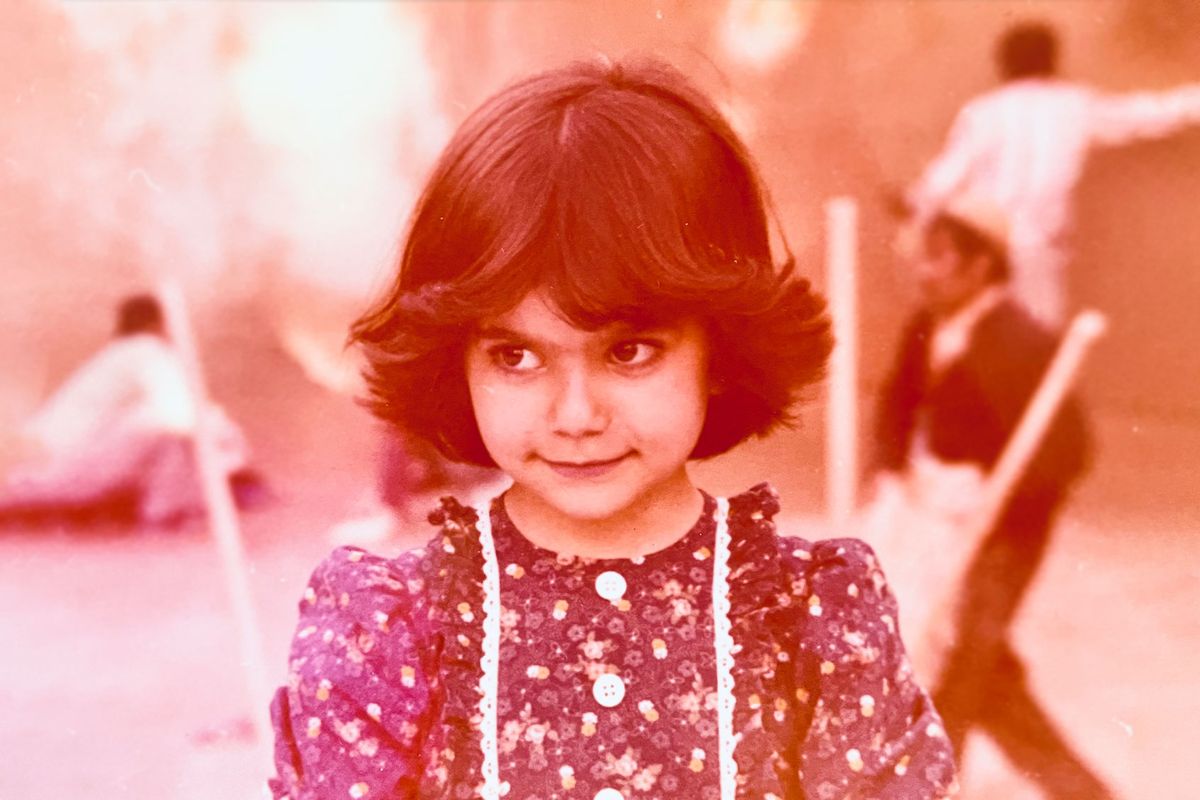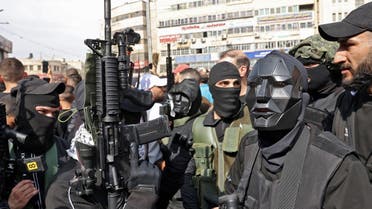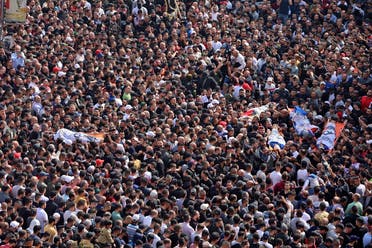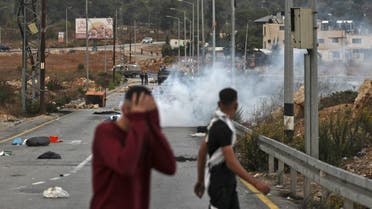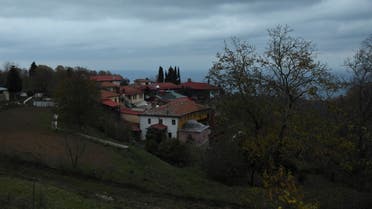
Canada's Prime Minister Justin Trudeau speaks at protest in support of freedom for women in Iran October 29, 2022 in Ottawa, Canada. Iran has been rocked by protests since 22-year-old Mahsa Amini's death on September 16, three days after she was arrested. (AFP)
AFP
Published: 30 October ,2022:
Prime Minister Justin Trudeau marched with protesters in the Canadian capital of Ottawa Saturday in support of demonstrations that have swept Iran for more than 40 days.
“The women in Iran, daughters and the grandmothers and the allies... they are not forgotten,” Trudeau said, standing in front of a white banner covered with dozens of red hand prints.
Iran has been gripped by six weeks of protests that erupted when Mahsa Amini, 22, died in custody after her arrest for an alleged breach of Iran’s strict dress rules for women.
“We will stand with you. I’ll march with you, I will hold hands with you. We will continue to stand with this beautiful community,” Trudeau said, before ending his speech by shouting Persian slogans, his fist raised.
The prime minister’s wife, Sophie Gregoire Trudeau, also joined the protest, saying, “I stand with you because when one woman’s right is being denied, it is a sign of disrespect for all women.”
“And we will leave no sister behind.”
Trudeau highlighted several rounds of sanctions imposed by the Canadian government against senior Iranian officials over the last month, levied due to the regime’s “gross and systematic human rights violations.”
Amini supporters also attended rallies in other Canadian cities, including Vancouver, Montreal and Toronto, where marchers formed human chains.
And thousands also protested Saturday in Paris and throughout France.
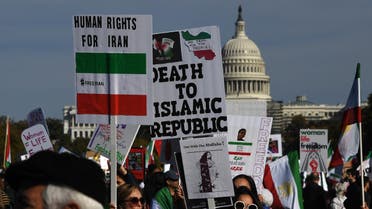
Protesters march in solidarity with protesters in Iran on the National Mall in Washington, DC, on October 22, 2022. (AFP)
Reuters
Published: 28 October ,2022:
The United States will next week put the United Nations spotlight on protests in Iran sparked by the death of a young woman in police custody and look for ways to promote credible, independent investigations into Iranian human rights abuses.
The United States and Albania will hold an informal UN Security Council gathering on Wednesday, according to a note outlining the event, seen by Reuters. Iranian Nobel Peace Prize laureate Shirin Ebadi and Iranian-born actress and activist Nazanin Boniadi are set to brief.
“The meeting will highlight the ongoing repression of women and girls and members of religious and ethnic minority groups in Iran,” the note said. “It will identify opportunities to promote credible, independent investigations into the Iranian government’s human rights violations and abuses.”
Independent UN investigator on human rights in Iran, Javaid Rehman, is also due to address the meeting, which can be attended by other UN member states and rights groups.
Iran has been gripped by protests since the death of 22-year-old Kurdish woman Mahsa Amini in police custody last month. The unrest has turned into a popular revolt by Iranians from all layers of society, posing one of the boldest challenges to the clerical leadership since the 1979 revolution.
Iran has blamed its foreign enemies and their agents for the unrest.
“The meeting will underscore ongoing unlawful use of force against protesters and the Iranian regime’s pursuit of human rights defenders and dissidents abroad to abduct or assassinate them in contravention of international law,” read the note about the planned meeting.
Rights groups have said at least 250 protesters have been killed and thousands arrested across the country. Women have played a prominent part in the protests, removing and burning veils. The deaths of several teenage girls reportedly killed during protests have fueled more anger.
UN Secretary-General Antonio Guterres has called on Iranian security forces to refrain from unnecessary or disproportionate force against protesters and appealed to all to exercise restraint and avoid further escalation.
Guterres has also called for a investigation of Amini’s death by an “independent competent authority.”
After the news of Amini's death emerged on social media of her lying in a Tehran hospital in a coma, people throughout the country became enraged.
October 21, 2022 by Broad Agenda

By Vrinda Narain and Fatemeh Sadeghi
On Sept. 16, 2022, Mahsa Amini, a 22-year-old Iranian woman, died in Tehran, Iran, while in police custody. Amini was arrested by the Guidance Patrol, the morality squad of the Law Enforcement Command of the Islamic Republic of Iran that oversees public implementation of hijab regulations, for not wearing a hijab properly.
Soon after the news of her death was broadcast and a photograph emerged on social media of her lying in a Tehran hospital in a coma, people throughout the country became enraged.
Amini’s death starkly illustrated the systematic violence of police and highlighted particularly the brutality of the regime towards women and minorities. She was Kurdish, a member of one of the most oppressed minority ethnic groups in Iran.
All Iranian women who are routinely humiliated because of their gender can empathize with her. But Kurds and Kurdish women in particular understood the political message of her death at the hands of police and the state’s subsequent violent response to the protests.
The huge wave of protests in Iran following Amini’s death represents a historic moment in Iran. People have taken to the streets shouting slogans against the compulsory hijab and denouncing Iran’s Supreme Leader, Ayatollah Khamenei.
Protests have raged in 31 provinces, including Kurdistan and Tehran as well as cities such as Rasht, Isfahan and Qom, among Iran’s most conservative communities. Dozens of people have been killed by security forces and hundreds more have been arrested.
The Girls of Revolution Street
Although the current uprising may seem unprecedented, it is in fact part of a deep-rooted and longstanding resistance movement by women in Iran.
In what is widely seen as a punishment to the hundreds of women who participated in the anti-regime protests leading to the Iranian Revolution of 1979, the hijab became compulsory two years later in 1981.
Consequently, publicly removing hijabs became a challenge to the regime in Iran.
Decades later, in 2017, Vida Movahed climbed onto a platform on Enghelab (Revolution) Street in the centre of Tehran, took off her headscarf and waved it in the air as a sign of opposition to compulsory hijab.
She was followed by other women and the movement quickly became known as The Girls of Revolution Street or Dokhtaran-e Khiaban-e Enghelab.
The Girls of Revolution Street represented a fundamental challenge by younger women to Iran’s compulsory veiling laws. Their actions resulted in an increase in the number of women who braved the streets without hijab in defiance of the state.
Unsurprisingly, when religious hardliner Ebrahim Raisi became president in the contested 2020 election, the message was clear: Women would be further oppressed.
Zan, Zendegi, Azadi: Woman, life, freedom
This recent uprising is a link in a chain of protests that together have the potential to bring about fundamental change in Iran.
It began with the pro-democracy Green Movement in 2009 followed by popular uprisings in 2018 and 2019. The Green Movement was largely peaceful, but the uprisings grew increasingly more confrontational with each wave of repression.
Women have been in the lead in all these protests, posing a real challenge to the regime. They’re the leaders of transformative change, the vanguard of a potential revolution, challenging the legitimacy of the current government..
The current protests are focused on two main demands: dignity and freedom. Both have been absent from political life in Iran, and both have a prominent presence in almost all slogans during this uprising, particularly “Woman, Life, Freedom.”
The recent uprising makes it clear that the demand for radical change in Iran today is strong and significant.
With every wave of protest, the desire for freedom gets stronger, the voices get louder and success is within reach. Once again, Iranian women are at the forefront of demanding transformative change.
With the strong support this time of men, political and ethnic minorities and other disenfranchised groups, they may be leading their country closer to a freer and more just society.

—
This post was previously published on Broad Agenda.
